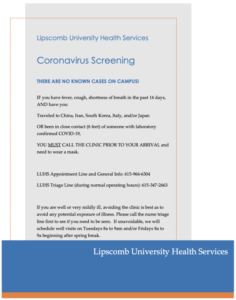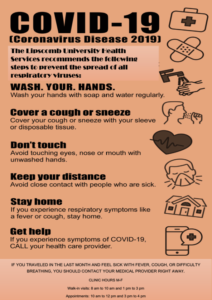Director of Health Services at Lipscomb, Erin Keckley’s first advice is, “There is no reason to panic”.
In December of 2019, the coronavirus, which is a group of viruses, was discovered when it was transmitted going from animal to animal and then human to human. This is a new virus, having no one previously been exposed to it, nobody is immune to COVID-19
This virus can cause illness ranging from the common cold to more severe diseases.
“The group we need to be the most careful with are the elderly, over the age of 60 years, and those with chronic diseases especially those with compromised immune systems,” said Keckley.
“This virus is spread by respiratory droplets,” said Keckley, “So when you cough or sneeze, these droplets float in the air and then eventually land on a surface.
Keckley explains important information about when you can get tested for this virus.
“It is important to know that there is no vaccine, no specific medication, or point of care testing. For you to be tested for the coronavirus, you have to meet certain criteria. Fever, cough, shortness of breath, cold symptoms, and you have to have been either in contact with someone who has had a laboratory-confirmed case or you have traveled in the past 14 days to one of the areas with a contagious level of two or three,” said Keckley.
So far there are only five countries labeled either a level two or three. China, Italy, Iran and South Korea are labeled level three and Japan is the only at level two right now.
Keckley wants everyone to be aware that they are working on a test so we will find out sooner but, for right now there are very specific criteria as to when they can screen someone.
Some common symptoms of this virus are fever, cough, and shortness of breath. Some less frequent symptoms are headache, sore throat, or diarrhea.
The incubation period is two to fourteen days. This is a long time before someone even knows if they are carrying this virus so it is very important to follow these prevention tips from Lipscomb’s Health Services:
- Make sure to wash your hands. This is the single most important thing you can do. It is also important to be washing for at least 20 seconds or more and using soap and water. “Take a song, make sure it’s at least 20 seconds long, and sing along,” Keckley said.
- Try to leave hand sanitizer in different places like your car, backpack, or room. So that whenever you get a second, you can apply.
- If you can, avoid shaking hands.
- Cover your mouth with a tissue when you cough or sneeze. Then, throw that tissue away.
- Try to stay on top of cleaning and disinfecting surfaces and objects that are frequently used.
- Try to avoid touching your face. Viruses are often transmitted through your mucus membrane through your hands, nose, and mouth. The average person touches their face 90 times a day. (This also includes wearing a mask if you aren’t sick. All this does is trap respiratory droplets into the mask and does not allow your air to be filtered and masks cause you to touch your face even more).
- If you have long hair, you should wear it up.
- Use your elbow to touch a button or a hip or foot to open the door.
- Avoid close contact when people are sick.
“Lipscomb is a caring community and wants to help people, especially our students but, right now we want to be socially distant. So please call, text, email, and drop off items they may need outside their door. If you do drop things off, wash your hands immediately and don’t touch door handles. The only time you do want to come in contact with someone that is sick is when they need transportation to a health center. We want you to help your friends but, from a distance,” said Keckley.
“In this population, it is common to have a mild cold and allergy season is only going to be another reason for coughing and sneezing, so it’s important for people not to panic.”
If you are sick, here are some tips on what actions to take. “If you are sick and are having tight chest pains, shortness of breath, or turning blue then you should go immediately to the doctor,” said Keckley. These are some extreme cases. “If you have very mild symptoms try to ride it out, stay hydrated, get rest, take over-the-counter medications, check your temperature, and make sure you are urinating at least every eight hours,” said Keckley.
“If you do plan on coming to the clinic, call the clinic before you come so we can put you in a designated location so we don’t pass that to others,” said Keckley.
“If you have a routine check-up maybe think about postponing your appointment. We want to help you but, we also don’t want to expose you to other things”.
Education is key and it brings down the fear factor in this. Make sure you are taking care of yourself by monitoring your breathing status, staying hydrated, washing your hands, and staying on top of all the ways to prevent it.
“It is important for the community to know that we are responding to this. We have had the pieces of training and protocols put in place. We have implemented screening questionnaires and different recommendations are coming out and we will adjust as we learn more,” said Keckley.
“It is vital so we are going to treat it like all other vital cases; time, rest, and water. If you are having any difficulty breathing, please seek immediate care.”
“Lipscomb health services have added a nurse triage line. This line allows you to speak with a nurse if you have any questions. You can call anytime during clinic hours,” said Keckley.
Nurse Triage Line: (615)-347-2663
Clinic Hours: Monday through Friday, 8 a.m. to 4:30 p.m.
For more information about this virus and ways to prevent it you can visit any of these websites:
Learn more about the coronavirus at Lipscomb’s Link
Centers for Disease Control and Prevention
Tennessee Department of Health



